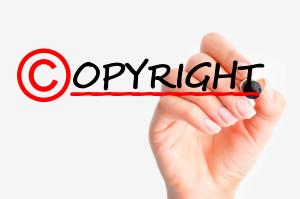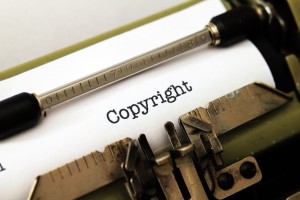 Several recent incidents have shown me that many authors, writers, and marketers don't understand copyright law. I asked one of the best author attorneys I know, Sallie Randolph, to explain it here because understanding the law will protect you from legitimate demands for fees for using copyright protected text or images.
Sallie is a practicing attorney, freelance writer, and publishing consultant. She concentrates her law practice on the representation of authors, often consulting with or serving as co-counsel to other attorneys on publishing cases. A frequent speaker at programs for lawyers and writers, she has also taught law, writing, and journalism in a variety of educational settings, including several years at the University of Buffalo Law School, where she developed a copyright compliance program, instructed and supervised law student interns, taught courses in publishing law and legal ethics, and directed a publishing and copyright clinic. She has also taught media law for journalism majors at Buffalo State College and professional writing for numerous institutions. Learn more at AuthorLaw.com. ]]>
Several recent incidents have shown me that many authors, writers, and marketers don't understand copyright law. I asked one of the best author attorneys I know, Sallie Randolph, to explain it here because understanding the law will protect you from legitimate demands for fees for using copyright protected text or images.
Sallie is a practicing attorney, freelance writer, and publishing consultant. She concentrates her law practice on the representation of authors, often consulting with or serving as co-counsel to other attorneys on publishing cases. A frequent speaker at programs for lawyers and writers, she has also taught law, writing, and journalism in a variety of educational settings, including several years at the University of Buffalo Law School, where she developed a copyright compliance program, instructed and supervised law student interns, taught courses in publishing law and legal ethics, and directed a publishing and copyright clinic. She has also taught media law for journalism majors at Buffalo State College and professional writing for numerous institutions. Learn more at AuthorLaw.com. ]]>Sallie is a practicing attorney, freelance writer, and publishing consultant. She concentrates her law practice on the representation of authors, often consulting with or serving as co-counsel to other attorneys on publishing cases. A frequent speaker at programs for lawyers and writers, she has also taught law, writing, and journalism in a variety of educational settings, including several years at the University of Buffalo Law School, where she developed a copyright compliance program, instructed and supervised law student interns, taught courses in publishing law and legal ethics, and directed a publishing and copyright clinic. She has also taught media law for journalism majors at Buffalo State College and professional writing for numerous institutions. Learn more at AuthorLaw.com.
Copyright basics for authors and writers
Every author, writer, freelancer, and content creator needs to understand copyright. You need to understand and protect your own copyright rights, and, equally important, respect the copyrights of others.
What is copyright?
The word copyright means, literally, the right to copy. It is the legal expression of a fundamental property right that has since existed since the earliest civilizations, but only emerged as distinct legal right after invention of the printing press. Before printing, the rights in words and symbols were perceived as a single property right that arose as soon as they were carved in stone, painted on skins, written on papyrus or fixed in another tangible medium of expression.
Printing technology didn’t change the concept of written works as property, but it triggered awareness of an important distinction — the difference between the tangible object upon which written words were fixed and the intangible expression of a unique work created through the writer’s selection and arrangement of those words.
This distinction between physical property and intellectual property formed the basis of copyright law. Copyright was the first intellectual property right recognized in law as the technology revolution unraveled new strands in the ancient bundle of intellectual property rights.
Exclusive rights of the copyright owner (section 106 , title 17, U.S. Code) are:
- To reproduce the work.
- To prepare derivative works.
- To distribute copies or phonorecords of the work to the public by sale, rental, lease, or lending.
- In the case of literary, musical, dramatic, and choreographic works, pantomimes, and motion pictures and other audiovisual works, to perform the work publicly.
- In the case of literary, musical, dramatic, and choreographic works, pantomimes, and pictorial, graphic, or sculptural works, including the individual images of a motion picture or other audiovisual work, to display the copyrighted work publicly.
- In the case of sound recordings, to perform the copyrighted work publicly by means of a digital audio transmission.
The creator of copyrightable subject matter owns a copyright at the moment the work is “fixed in a tangible medium of expression.” But enforcement and protection of copyright rights takes effort:
- Registration: Registration of copyright is optional, but it provides important benefits and is a requirement to sue in federal court for copyright infringement.
- Monitoring: Many copyright owners regularly monitor social networking sites and the internet to see if their work is being infringed. Finding examples of infringement can be as simple as doing a Google search for a string of distinctive text to using sophisticated software capable of identifying specific photos and graphics.
- Enforcement Options: Those who find examples of infringement have a range of tools ranging from polite, diplomatic communications to strongly worded lawyer letters, to litigation – the filing of an actual lawsuit in federal court. An effective “do it yourself” option that victims of infringement may use is notice and takedown under the Digital Millennium Copyright Act (DMCA).
Respect copyright to avoid liability
Since the advent of the internet, there have been wild and misguided claims that copyright law is outdated and that “information wants to be free.” Such claims are simply not true.
These critics of copyright are really asking: “Now that it’s cheap and easy, isn’t it OK to steal words, music and art?” The answer is no. Copyright infringement is theft, pure and simple. Copyright law is clear and basic – words, pictures and sounds expressed in a distinctive way and written down or otherwise fixed in a tangible medium of expression are the property of the creator. “Thou shalt not steal,” is a core tenant recognized in virtually every civilized society and it applies to the rights of authors today.
Authors, in particular, should understand and respect copyright. Remember that rights in photos belong to the photographer, music to the composer, paintings to the artist. I am sometimes shocked at a few writers who just don’t “get it” and think that it’s OK to: download music from pirate sites or make up CD’s of their favorite music to give as gift; post photos they find on line on their own websites; or, use extensive quotations from other authors in their own work. Such assumptions are wrong.
Copyright is complicated, and copyright issues can come up in numerous, sometimes counter-intuitive and often convoluted ways. If you’re confused about copyright, keep the following points in mind:
- It’s not OK for someone to help themselves to your work, but it can sometimes be difficult to enforce your rights.
- It’s not OK to help yourself to someone else’s work, and you subject yourself to liability if you do.
- Permission makes it OK to use someone else’s work but attribution does not.
Get your copyright information from reliable sources. The copyright office, www.copyright.gov, is one of the best sources of accurate information. Consider your copyright education as a work in progress. There’s a lot to learn, so keep an open mind, don’t make assumptions, and don’t buy into copyright myths.
Some authors don’t care if others share their content with others because they believe the exposure is good for book sales or their career. How do you feel about that, even if that copying/pasting/sharing is a copyright violation? Please share your thoughts in a comment.
]]>
